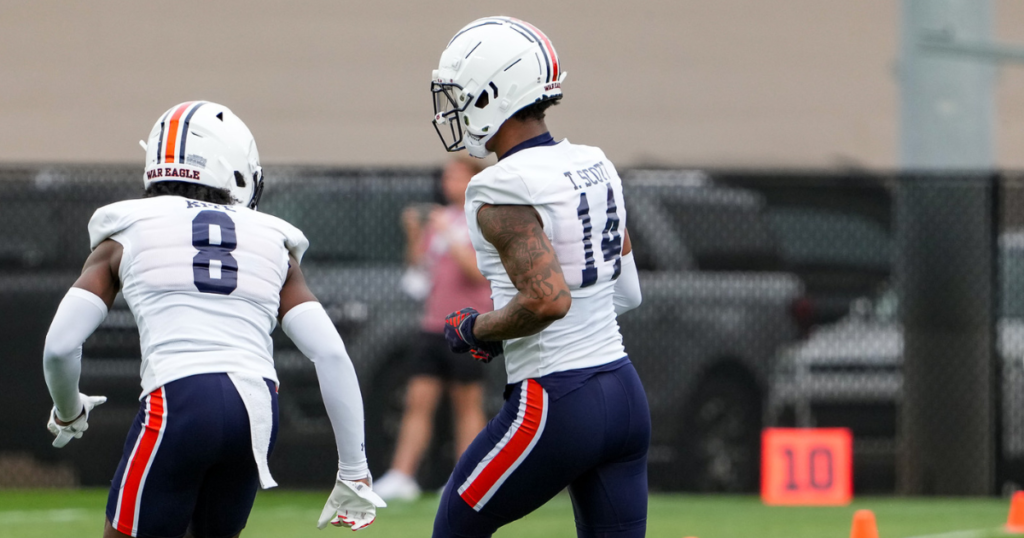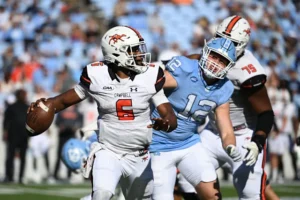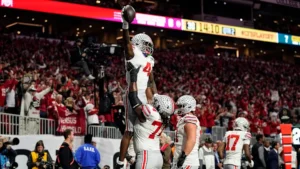
TRANSFER PORTAL: Former 4-Star Tyler Scott, an Auburn cornerback, joins Georgia State
In recent years, the college football transfer portal has reshaped the landscape of the sport, offering athletes a second chance at finding a program where they can thrive. One of the most recent and noteworthy developments involves Tyler Scott, a former four-star cornerback, who has made the decision to leave Auburn University and transfer to Georgia State University. This move is significant for multiple reasons, from Scott’s past as a highly touted recruit to the implications it holds for both Auburn and Georgia State.
In this article, we’ll explore the circumstances leading to Scott’s transfer, the impact on both his previous and new programs, and what this change means for his future in college football. We’ll also dive into the broader implications of the transfer portal on the sport and how it’s altering the trajectory of careers and the makeup of college football rosters.
Tyler Scott, a cornerback known for his athleticism, instincts, and playmaking ability, was once regarded as one of the top high school football players in the country. Originally from the state of Alabama, Scott attended a well-known prep school that placed him on the radar of many college programs. His high school performances earned him a four-star rating, signaling a bright future at the next level.
During his recruiting process, Scott garnered attention from some of the biggest college football programs in the nation. His combination of speed, physicality, and natural ball skills made him a desirable recruit for schools looking to bolster their defensive backfield. Ultimately, he chose Auburn University, a program with a proud football tradition and a reputation for developing top-tier defensive talent.
At Auburn, Scott was seen as a potential cornerstone in the Tigers’ defensive backfield, with many scouts projecting him to be a key contributor. His early years on campus, however, didn’t unfold as expected, and his path to consistent playing time faced some roadblocks. As the college football landscape has shifted and the transfer portal has become a more prominent part of the equation, Scott, like many other athletes, found himself looking for a new opportunity to continue his career.
Tyler Scott’s time at Auburn was marked by both promise and frustration. As a high-profile recruit, he entered the program with high expectations. However, competing in the ultra-competitive SEC, Scott faced tough odds in earning significant playing time. Auburn’s cornerback room, which has been home to multiple NFL-bound players over the years, was deep and talented, making it difficult for Scott to break into the starting lineup consistently.
Despite not seeing as much playing time as he might have hoped, Scott’s potential was never in question. His speed, physicality, and ability to read the quarterback’s eyes were qualities that stood out in practice and during the limited opportunities he did receive in games. However, with the emergence of other cornerbacks and changes in coaching staff, Scott’s chances to make an impact on the field were diminished.
In addition to the on-field challenges, Scott, like many student-athletes, faced the intense pressures that come with playing at a program like Auburn. Balancing academics, football, and personal life is never easy, and for Scott, this balancing act may have played a role in his decision to explore other opportunities. With the rise of the transfer portal as a viable option for athletes seeking a fresh start, Scott decided to enter the portal and find a program where he could maximize his potential.
Scott’s decision to transfer to Georgia State University represents a significant shift in his college football career. Georgia State, located in Atlanta, has grown in stature over the past decade, gradually becoming a more competitive program in the Sun Belt Conference. While the Panthers may not have the historical pedigree of a program like Auburn, they have been making strides under head coach Shawn Elliott, who has cultivated a culture of development and growth within the program.
For Scott, Georgia State represents an opportunity to step into a more prominent role and prove that he can live up to the high expectations that surrounded him as a recruit. The Sun Belt Conference may not feature the same level of competition as the SEC, but it is a conference that has produced talented players who have gone on to successful careers in both college football and the NFL. With the right development, Scott could be a standout in the Sun Belt and potentially work his way into NFL draft consideration in the future.
Georgia State’s defensive staff, which has been known for its ability to develop players and maximize their potential, will likely be thrilled to have Scott on board. His experience at Auburn, even if he didn’t play as much as he would have liked, will help him bring a level of maturity and understanding of the game that could benefit Georgia State’s defense.
For Scott, this transfer is a chance to reset and focus on becoming the player that scouts once projected him to be. By joining a program that will likely give him more opportunities to play, he can rebuild his confidence and showcase his skills. In a conference that has seen its fair share of emerging talent, Scott’s addition to Georgia State could elevate the Panthers’ defense and add a dynamic playmaker to their secondary.
For Georgia State, acquiring a player of Tyler Scott’s pedigree is a massive win. The Panthers have made strides as a program, and adding a former four-star recruit to their defensive backfield signals the program’s continued commitment to building a competitive roster. Scott’s experience at Auburn, even if it was in a limited role, will add depth and skill to a cornerback group that could use a boost in talent.
Georgia State’s coaching staff will be looking to help Scott refine his skills, develop a strong understanding of their defensive system, and improve his consistency. If Scott can stay healthy and adjust to the level of competition in the Sun Belt, he has the chance to be a game-changer for the Panthers. Given the state of the Sun Belt and Georgia State’s growing ambitions, Scott’s performance could play a significant role in helping elevate the program to new heights.
Additionally, Scott’s transfer to Georgia State serves as a reminder of the increasing importance of the transfer portal. More and more, players are leaving traditional powerhouses in search of more playing time and a fresh start, and Georgia State is one of the programs that has benefited from this trend. As the Panthers continue to build their program and attract more talented players like Scott, they could become a more serious contender in the Sun Belt, and eventually, on the national scene.
Tyler Scott’s transfer from Auburn to Georgia State highlights the broader trend of the transfer portal’s influence on college football. The portal, which allows players to transfer freely between programs without the penalty of losing eligibility, has significantly altered the way teams build rosters and how players approach their careers.
For players like Scott, the transfer portal offers a chance to find a better fit, whether it’s due to playing time, system fit, or other personal reasons. For programs, it provides an opportunity to fill gaps in their roster or bring in experienced players to immediately bolster their teams. As more and more players utilize the portal, it has become a major factor in shaping team compositions and overall strategies.
One of the most notable effects of the transfer portal is the increased mobility of players. No longer are athletes bound to their original commitments; they now have the power to pursue new opportunities at a variety of programs. This can lead to unexpected and intriguing transfers, like Scott’s move to Georgia State, and can alter the competitive balance of college football. Programs that were once considered long shots or “mid-major” programs now have a chance to bring in top-tier talent and become serious contenders.
However, this shift also raises questions about the future of college football. As the portal continues to evolve, it’s unclear how this will affect recruiting strategies, player development, and overall team chemistry. Programs that can effectively manage the transfer portal will likely have a competitive edge, while those that struggle to adjust may find themselves falling behind.
Tyler Scott’s decision to leave Auburn and transfer to Georgia State represents a significant moment in his career. The former four-star cornerback is seeking a fresh start, a chance to prove his worth in a new system, and an opportunity to continue his football journey. For Georgia State, acquiring a player of Scott’s caliber is a major win and could be a key factor in the program’s continued growth and success in the Sun Belt.
This transfer is also a microcosm of the larger trends shaping college football today. The transfer portal has fundamentally changed the way teams build their rosters, and players like Scott are increasingly taking advantage of the opportunity to find a program that better suits their needs. Whether or not Scott can live up to his potential at Georgia State remains to be seen, but one thing is clear: this move will have a lasting impact on both his career and the future of college football.





